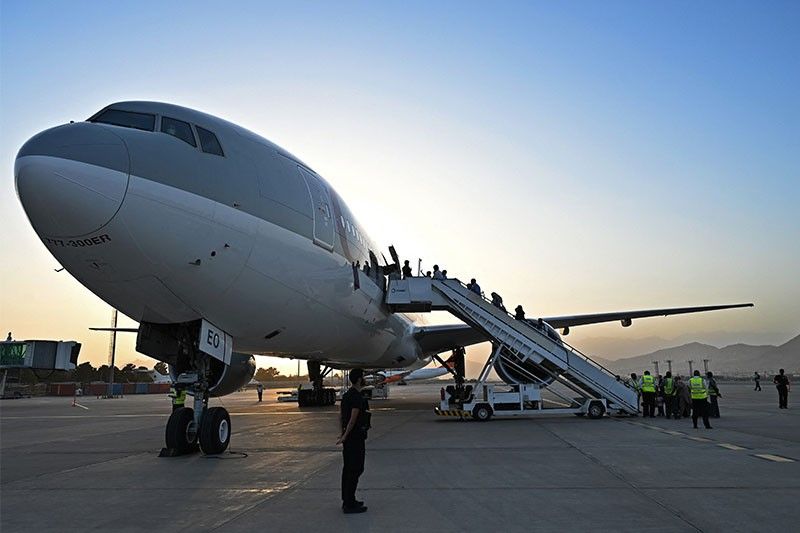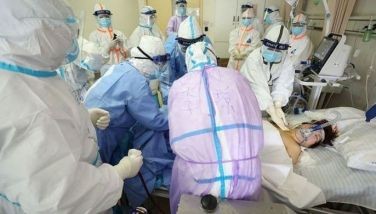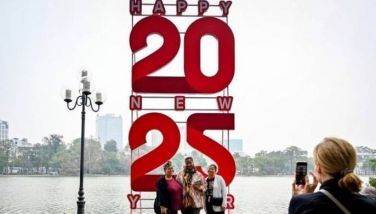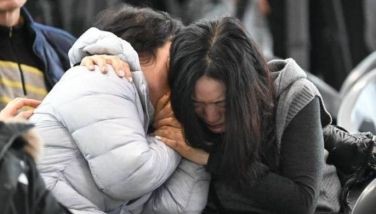More than 100 passengers leave Kabul in first flight since US pullout

KABUL, Afghanistan — Just over 100 passengers, including some Americans, left Kabul airport on Thursday on the first flight carrying foreigners out of the Afghan capital since a US-led evacuation ended on August 30.
The first international flight came as the Taliban continue their transition from insurgents to governing power, less than a month after they marched into Kabul and ousted president Ashraf Ghani.
More than 100 passengers were on the Qatar Airways flight that landed in Doha on Thursday evening, 10 days after a mammoth, chaotic airlift of more than 120,000 people came to a dramatic close with the US pullout.
An Afghan-American dual citizen, waiting to board the flight with his family, said the US State Department had called him in the morning and told him to go to the airport.
"We got in contact with the State Department, they gave me a call this morning and said to go to the airport," the father, who asked not to be named, told AFP.
In the days that followed the Taliban's blitz, the airport had become a tragic symbol of desperation among Afghans terrified of the militants' return to power — with thousands of people crowding around its gates daily, and some even clinging to jets as they took off.
More than 100 people were killed, including 13 US troops, in a suicide attack on August 26 near the airport that was claimed by the Islamic State group's local chapter.
Away from the airport, there was a noticeably stronger Taliban presence on the streets of Kabul as armed fighters — including special forces in military fatigues — stood guard on street corners and manned checkpoints, according to AFP journalists.
Waiting with suitcases
Qatar has acted as the central intermediary between the Taliban and the international community in recent years, and numerous countries, including the United States, have relocated their embassies from Kabul to Doha in the aftermath of the Taliban takeover.
Doha has said it worked with Turkey to swiftly resume operations at Kabul's airport to allow the flow of people and aid.
An airport official in Kabul said just over 100 people boarded the flight. A source with knowledge of the operation in Doha said 113 were on board. Sources had earlier said that as many as 200 people were aboard.
The White House spoke in positive terms about how the Taliban handled the charter flight that included Americans.
"They have shown flexibility, and they have been businesslike and professional in our dealings with them in this effort," National Security Council spokesperson Emily Horne added, stressing that efforts to facilitate such evacuations of Americans and Afghans who worked with the US mission would continue.
White House press secretary Jen Psaki declined to say at a press conference how many Americans were on the flight, saying the plane had only just landed and the US did not yet have all the details.
Earlier in the day Psaki said there were around 100 Americans still in Afghanistan and wishing to leave.
The United States "facilitated" Thursday's departure of Americans and it thanked Qatar for its role, Horne said.
Canada's Foreign Ministry said 43 citizens of that country were on the plane and that they will be repatriated in the next few days.
Dutch Foreign Minister Sigrid Kaag tweeted to thank the Qatari government "for making this possible" and said 13 Dutch nationals were on board the flight.
Protest ban
Most of the early Afghan evacuees were desperate to flee fearing Taliban reprisals for having worked with foreign powers during the 20-year, US-led occupation.
The Taliban have said they will not prevent anyone who wishes to from leaving the country, even as they have urged skilled Afghans, such as doctors and engineers, to remain.
The Islamist hardliners have pledged a more moderate brand of rule than in their notoriously oppressive 1996-2001 reign.
However, they have shown clear signs that they will not tolerate opposition.
Earlier this week armed Taliban militants dispersed hundreds of protesters in cities across Afghanistan, including Kabul, Faizabad in the northeast and in Herat in the west, where two people were shot dead.
Late Wednesday, they moved to snuff out any further civil unrest, saying protests would need prior authorisation from the justice ministry, adding that no demonstrations were allowed "for the time being".
One protest organiser told AFP rallies in Kabul had been cancelled because of the overnight ban.
Promises of inclusion
A Taliban interim government, drawn exclusively from loyalist ranks, formally began work this week with established hardliners in all key posts and no women -– despite previous promises of an inclusive administration for all Afghans.
All the top positions have been handed to key leaders from the movement and in particular the Haqqani network — the most violent Taliban faction, known for devastating attacks.
The dreaded Ministry for the Promotion of Virtue and Prevention of Vice — previously responsible for arresting and punishing people for failing to follow the movement's restrictive interpretation of sharia — is being reinstated.
Get the latest news as Taliban gains control of Afghanistan. Photo courtesy of Al Jazeera/AFP
Afghanistan's supreme leader said Sunday the country's women were being saved from "traditional oppressions" by the adoption of Islamic governance and their status as "free and dignified human beings" restored.
In a statement marking this week's Eid al-Adha holiday, Hibatullah Akhundzada -- who rarely appears in public and rules by decree from the Taliban's birthplace in Kandahar -- said steps had been taken to provide women with a "comfortable and prosperous life according to Islamic Sharia".
The United Nations expressed "deep concern" last week that women were being deprived of their rights under Afghanistan's Taliban government and warned of systematic gender apartheid.
Since returning to power in August 2021, Taliban authorities have stopped girls and women from attending high school or university, banned them from parks, gyms and public baths, and ordered them to cover up when leaving home.
They have also barred them from working for the UN or NGOs, while most female government employees have been dismissed from their jobs or are being paid to stay at home.
However, Akhundzada said "necessary steps have been taken for the betterment of women as half of the society".
"All institutions have been obliged to help women in securing marriage, inheritance and other rights," his statement read. — AFP
UN chief Antonio Guterres will gather international envoys at a secret location in Doha on Monday in an increasingly desperate bid to find ways to influence Afghanistan's Taliban rulers. — AFP
The UN Security Council adopted a resolution Thursday calling on Taliban authorities to "swiftly reverse" all restrictive measures against women, condemning in particular its ban on Afghan women working for the United Nations.
The resolution, unanimously adopted by all 15 Council members, said the ban announced in early April "undermines human rights and humanitarian principles."
More broadly, the Council called on the Taliban government to "swiftly reverse the policies and practices that restrict the enjoyment by women and girls of their human rights and fundamental freedoms."
It cited access to education, employment, freedom of movement, and "women's full, equal and meaningful participation in public life."
The Council also urged "all States and organizations to use their influence" to "promote an urgent reversal of these policies and practices." — AFP
G7 foreign ministers on Tuesday demanded the "immediate reversal" of a ban on women in Afghanistan working for non-governmental organisations and the United Nations.
"We call for the immediate reversal of unacceptable decisions restricting human rights and fundamental freedoms, including the latest bans prohibiting Afghan women from working for NGOs and the UN," the top diplomats said in a statement after two days of talks in Japan.
The group also slammed the Taliban authorities' "systematic abuses of human rights of women and girls and discrimination against the members of religious and ethnic minorities".
Taliban authorities triggered international outrage this month after extending a December ban on Afghan women working for non-governmental organisations to include the UN.
They have rejected criticism over the move, saying it is an internal issue that should be "respected by all sides." — AFP
The United Nations is being forced to make an "appalling choice" over whether to continue operations in Afghanistan while the Taliban government bans women from working for the organisation, the world body says.
Under their austere interpretation of Islam, Taliban authorities have imposed a slew of restrictions on Afghan women since seizing power in 2021, including banning them from higher education and many government jobs.
In December, they banned Afghan women from working for domestic and foreign non-governmental organisations, and on April 4 extended that to UN offices across the country.
In a statement Tuesday, the UN mission in Afghanistan said the ban was "unlawful under international law, including the UN Charter, and for that reason the United Nations cannot comply".
"Through this ban, the Taliban de facto authorities seek to force the United Nations into having to make an appalling choice between staying and delivering in support of the Afghan people and standing by the norms and principles we are duty-bound to uphold," it said. — AFP
- Latest
- Trending





























